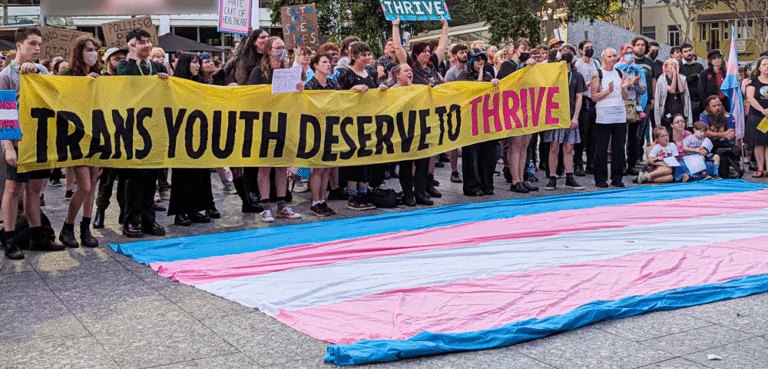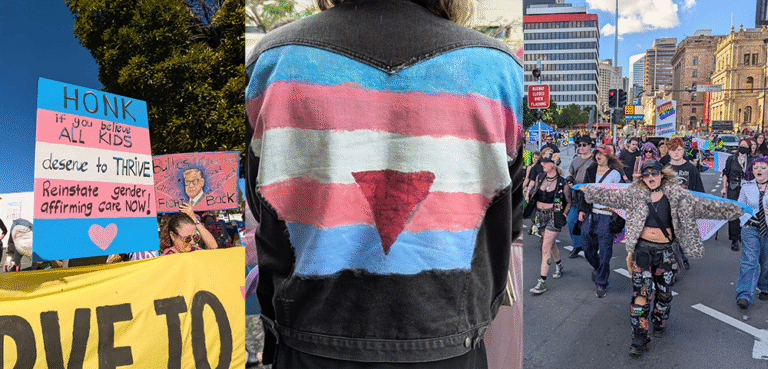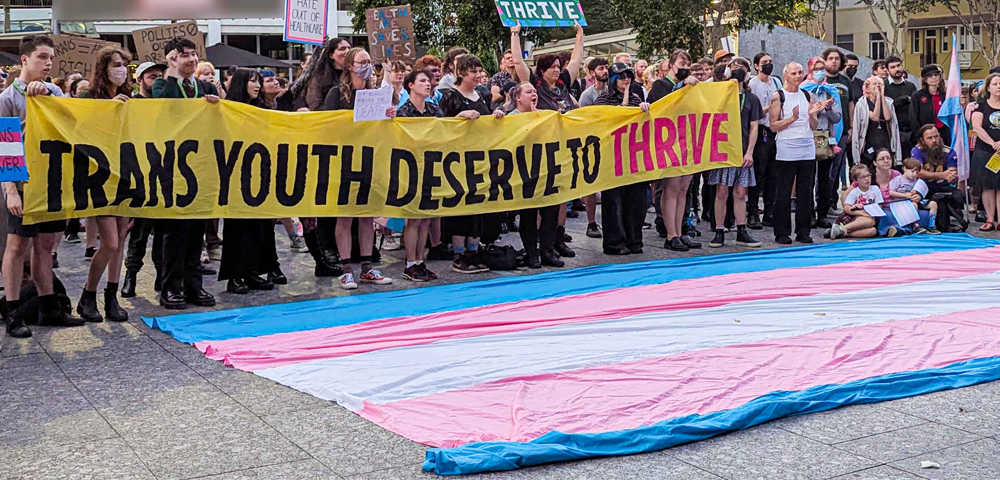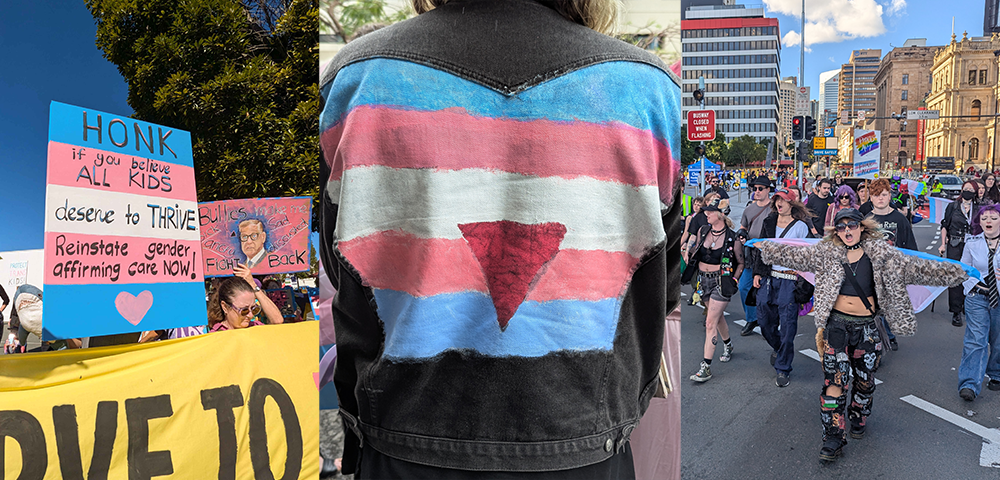
How Will The Cass Review Affect Aussie Trans Youth?

Earlier this week the Cass Review was released to examine the National Health Service in England, addressing changes to treatment of young people with gender dysphoria.
While many of the recommendations in the Cass Review would be sensible to implement in an ideal world, England is far from idyllic for trans people.
Many healthcare workers and trans advocates are pessimistic about how her review will be used by the Tory government to further restrict healthcare to trans minors.
What is the Cass Review?
In 2020 England’s National Health Service (NHS) commissioned Dr Hilary Cass, a paediatrician and former president of the Royal College of Paediatrics and Child Health, to conduct a review of gender affirming healthcare for children and young people in England and Wales.
This was in response to a sharp increase in people, and particularly people assigned female at birth, presenting to the Gender Identity Development Service (GIDS) at the Tavistock and Portman NHS Foundation Trust in London.
At the time, this was the only NHS-run gender clinic for trans people under the age of 18.
What does the review recommend?
The Cass Review recognises that the current system is failing gender-questioning and trans youth. Wait times of over 5 years and high levels of stigma towards this area of medicine mean that many patients become too old to be seen by youth clinic before even setting a foot in the door.
The aim of the review was to produce recommendations for a better way to provide gender affirming healthcare. To do this, Dr Cass employed The University of York to conduct interviews with workers and children and look into all of the existing scientific literature around trans health.
Its 32 recommendations include the establishment of a network of regional gender clinics, greater infrastructure for data collection, the creation of specific clinics for pre-pubescent children, people aged 18-25, and detransitioners, and compulsory screening for mental illness and neurodivergence before medical intervention for gender dysphoria.
In an interview with the British Medical Journal, Dr Cass stated that “how [trans children] feel is absolutely real. Their sense of discomfort with their gender is real. But what we don’t know, and the assessments can’t tell us, is whether it’s going to feel the same for them in 5 or 10 years time.” As such, her review overall recommends a cautious approach for treating gender dysphoria.
Reactions to the Cass Review
Dr Cass’ interim report, released in 2022, recommended that GIDS at Tavistock be closed and multiple small, regional hubs be built.
GIDS was shut down, but only two new regional gender centres out of a proposed eight have been built.
According to Aiden Kelly of private gender clinic Gender Plus, while GIDS had 80 clinicians trained in trans healthcare, the new clinics have a total of 18 untrained staff working without a shared model of care.
The review also led the NHS to ban puberty blockers – medication that delays the onset of puberty – outside the context of medical trials.
Much criticism of the Cass Review has concerned its dismissive approach to the existing body of evidence. The review viewed studies without randomised double-blind controls as poor quality, which many have claimed is an impractical standard.
Many trials for new drugs use this method, which involves randomly dividing patients into two groups – the active group and the control group. The active group receives real medication and the control group receives a placebo, with neither doctors nor patients knowing which group a person has been assigned to.
Dr Hane Maung, Clinical Ethicist at private gender clinic GenderGP, stated “For many medical interventions, including gender affirming medical treatment for trans youth, randomised controlled trials are unfeasible and unethical, because the consequences of not intervening would be very apparent to the participants and also would be unacceptably harmful … By dismissing this evidence because it did not come from randomised controlled trials, the Cass Review is holding gender affirming medical treatment to an unreasonable and unethical standard that is not required of many other healthcare interventions.”
Dr Kelly told Novara Media that “it would be wonderful if we had rock solid evidence … but in paediatric health care the majority of treatments that are delivered are delivered off label, and without those randomised control trials … I think it’s always good to want the best for people, but we have to also look at what are going to be the outcomes or the implications for taking [this report’s approach], because it will be a generation of trans young people that will kind of likely miss out on access to healthcare.”
Natacha Kennedy from the Feminist Gender Equality Network told Novara Media that the Cass review was “asking for a much higher standard of evidence to support [existing models of care] and then they are dismissing most of that evidence. But what they’re proposing [to replace it] is not based on any evidence at all.”
Journalist Freddy McConnell sums up the feeling of many in the trans community that “allowing her review to be so heavily influenced by bias is a critical failure that is [Dr Cass’] to own.”
The mother of a trans child interviewed by The Guardian stated that the Cass review appears to represent “an agenda from up on high that things need to be more difficult.”
Trans Youth charity Mermaids released a statement saying “we are concerned that some of the language in the report is open to misinterpretation and could be used to justify additional barriers to accessing care for some trans young people in the same way the interim report has been.”
In an interview with independent journalist Owen Jones, Dr Kelly stated that “overall there are some sensible things … the idea of a better evidence base, holistic care, being able to meet all the needs of people that present to services, being cautious and careful with children … all that stuff on the surface makes sense [but] the worry I would hold is given the …NHS in terms of funding, but moreso the political climate around whether trans people should have access to healthcare at all … and so I don’t know how any of this is going to actually translate into making trans people’s lives any better really.”
Writing in The Telegraph, British Health Secretary Victoria Atkins stated that there has been “a culture of secrecy and ideology over evidence and safety. Today I’m saying ‘enough’. We simply do not know the lifelong impact of these medical interventions on young minds and bodies to be clear that they are safe.”
Relevance to Australia
How relevant the Cass Review will be to Australia’s healthcare system is unknown. Head of the University of Melbourne’s trans health research group Associate Professor Ada Cheung told the Sydney Morning Herald that “The Cass report goes against the consensus of professional medical associations around the world and I don’t think it is relevant to practice in Australia.”
She told ABC News that “the way that gender affirming care is accessed and provided in Australia is substantially different to the NHS.” A spokesperson for Health Minister Mark Butler agreed that the systems for children’s gender affirming healthcare are different in Australia compared to the UK.
Dr Portia Predny told the ABC that “in Australia, our guidelines for gender affirming care for young people already prioritise holistic, individualised and person-centred care with the involvement of multidisciplinary teams of clinicians with all kinds of areas of expertise, to help and support young people to navigate their gender journey.”
A joint statement by Equality Australia details criticisms of the review by representatives of AusPATH, PATHA, ACON, Equality Australia, PTYE, Transcend, the Trans Justive Project, TGV, the Gender Centre, Switchboard Victoria and twenty10.
However, both The Australian and Sky News have used the release of this report to call for an investigation of trans healthcare in Australia. Jacinta Nampijinpa Price has stated that she will seek to start a debate about trans athletes.
Last year, NSW began a review into its provision of gender-affirming healthcare services after a controversial study published by the Westmead Children’s Hospital led to multiple staff resignations. Queensland is also reviewing its services after patient complaints led to the suspension of one of its doctors. Based on advice from the Australian Medical Association, the federal government Australian government rejected calls in 2020 for a national inquiry into gender affirming care for young people.
You can read the Cass Review in full here.
This article was written and prepared by Dr Antimony Dior.











Thankyou for this summary